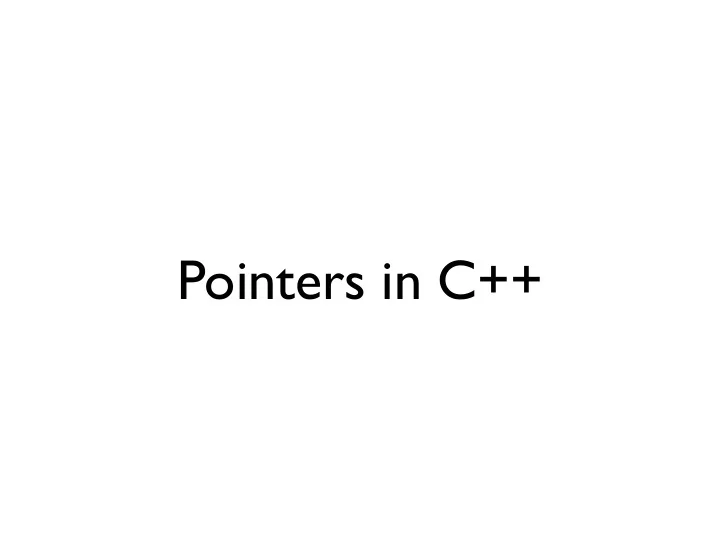

Pointers in C++
(Basically) everything in C++ resides somewhere in memory
int main() { int a = 23; cout << "a's value is " << a; }
“a” has an address But what is it? int main() { int a = 23; cout << "a's value is " << a; }
&a Give me the address of a
Please Please Please Don’t get this confused with a reference They are totally different things!
Please Please Please Don’t get this confused with a reference They are totally different things! (Forget about references for now..)
Everything in C++ also has a size
sizeof(a)
This whole thing is a 1st 2nd 3rd 4th 0x7fff5388990c
Local variables are stored on the stack Variables next to each other, are placed next to each other on the stack
So now, what will this do?
int main() { int a = 23; int b = 24; cout << "a's value is " << a << endl; cout << "a's address is " << &a << endl; cout << "the size of a is " << sizeof(a) << endl; cout << "b's value is " << b << endl; cout << "b's address is " << &b << endl; cout << "the size of b is " << sizeof(b) << endl; } Assuming a is 0x7fff5388990c
Lesson: the stack grows down
When C++ calls a function, it creates space for its local variables on the stack When C++ returns from a function, it destroys those by moving the stack up
Let’s call another…
If I know someone’s address, I can go get the data at that address…
*(&a) is the same as a
I can use the * operator to get the data at some address
I can even store addresses int *pointerToA = &a;
void storingPtr() { int a = 23; int *pointerToA = &a; cout << "a's value is " << *pointerToA << endl; cout << "&a is " << &a << endl; cout << "pointerToA is " << pointerToA << endl; cout << "&pointerToA is " << &pointerToA << endl; cout << "sizeof(pointerToA) is " << sizeof(pointerToA) << endl; return; }
Note: all pointers take up the same number of bytes And that number depends on your machine (32/64-bit)
What happens if I want to use a pointer after the function returns?
int *returnsABadPointer() { int a = 23; int *ptr = &a; cout << "the value of *ptr is " << *ptr << endl; return &a; } void doSomethingBad() { int *ptr = returnsABadPointer(); cout << "the value of *ptr is " << *ptr << endl; return; }
Lesson: once the function returns, that pointer is meaningless
Lesson: once the function returns, that pointer is meaningless Even worse, if I continue to use it, it could cause security problems
Lesson: once the function returns, that pointer is meaningless Even worse, if I continue to use it, it could cause security problems An attacker could figure out how to load their data into *ptr and control my code
So how can I hold onto things after returns!?
I use the heap
Unlike the stack, when I put things on the heap, they stay there until I tell them to go away
int *newPointer() { int *a = new int; *a = 23; return a; } void doSomethingFine() { int *ptr = newPointer(); cout << "the value of *ptr is " << *ptr; *ptr++ cout << "the value of *ptr is " << *ptr; delete ptr; }
int *newPointer() { int *a = new int; *a = 23; return a; } void doSomethingFine() { int *ptr = newPointer(); cout << "the value of *ptr is " << *ptr; *ptr++ cout << "the value of *ptr is " << *ptr; delete ptr; } Note: I used delete
If I don’t remember to call delete , the memory will never go away It will live on forever, like a zombie Gradually, the world will be taken over…
void useAllMyMemory() { for (long long i = 0; i < 12346789000; i++) { int *ptr = new int; } return; }
void dontUseAllMyMemory() { for (long long i = 0; i < 12346789000; i++) { int *ptr = new int; delete ptr; } return; }
Recommend
More recommend